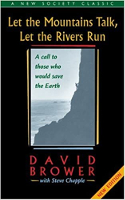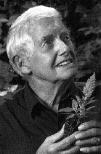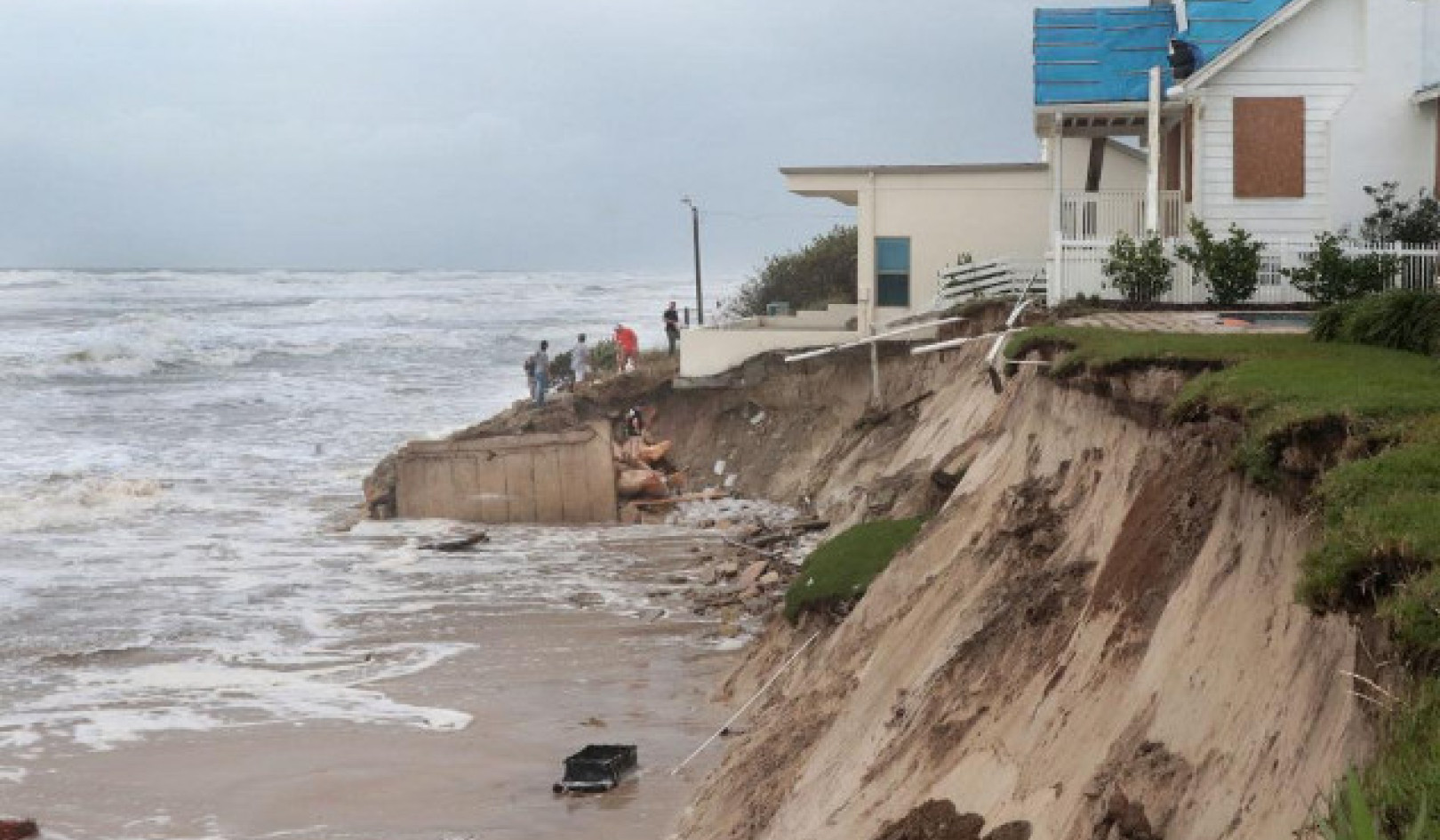
In the Scottish Himalayan Expedition, mountaineer William H. Murray reflected on the organization and willpower necessary to begin the expedition:
"Until one is committed there is hesitancy, the chance to draw back, always ineffectiveness. Concerning all acts of initiative (and creation, there is one elementary truth, the ignorance of which kills countless ideas and splendid plans: that the moment one definitely commits oneself, then Providence moves, too. All sorts of things occur to help one that would never otherwise have occurred. A whole stream of events issues from the decision, raising in one's favour all manner of unforeseen incidents and meetings and material assistance, which no man could have dreamt would have come his way."
In the not-so-distant past, I saw Murray's remark on commitment serve almost as religion for the people, including me, who helped keep dams out of Dinosaur National Monument, the Yukon, and the Grand Canyon, who helped keep loggers with itchy axes out of Olympic National Park; who helped ban DDT; who helped establish the National Wilderness Preservation System and additions to the National Park System in the North Cascades, Kings Canyon, the Redwoods, Great Basin, at Point Reyes, the Golden Gate, Cape Cod, Fire Island.
We helped do all this with a Sierra Club membership less than one-tenth of its present size. Even our success in gaining passage of the Alaska National Interest Lands Conservation Act of 1980 was accomplished with a far smaller club than now exists.
Back then the Sierra Club made all this possible by boldly asserting itself. It took the words of John Muir to heart: "Climb the mountains and get their good tidings."
Millions of Environmentalists Should Have More Power
There are now millions of dues-paying environmentalists in the United States alone. Some count the number at 10 million. There are more; they just haven't signed up yet. But whatever the number, they don't seem to have anywhere near the power they should.
What are the reasons for this? The quick and dirty answer is: lack of boldness, smug leadership, battles over turf, absence from the legislative arena, bureaucracy, and no fun.
I like to pose this question: What do environmentalists, feminists, the far-righteous, the right-to-lifers, and the Bible have in common? Answer: No humor. No one has disagreed yet.
Of course, maybe we need two Green Parties, the light green and the dark green. That is, Republican and Democrat, conservative and progressive. The environmental movement needs to be much more a part of political discussion in this country. This was the reason I founded the League of Conservation Voters, so that we could see who was voting on the side of the Earth, and who was out there trashing it.
By whatever means, we need to send a message: It would be nice to make a new try at practicing democracy.
How To Bring Politicians to Want to Save the Earth
How do you bring politicians onto the side of saving the Earth? The first thing you do is show them what they are saving, as we did on those High Trips, or as John Muir did when he camped in Yosemite with President Theodore Roosevelt. Roosevelt went away rhapsodizing about natural cathedrals.
Back in Washington, he helped to protect a great deal of wilderness from those in his own party who wanted to scalp, pulp, and package everything that lay between the cities. They did a pretty good job of that in Michigan, Wisconsin, Oregon, and Washington, in Roosevelt's time. At the rim of the Grand Canyon, he could say, "Leave it as it is. The ages have been at work on it, and man can only mar it."
Roosevelt didn't need much convincing. At a time when he was severely depressed, after his wife and daughter had tragically and suddenly died, he came to the Badlands of the Dakotas and Montana with the idea of healing himself in wildness. When he left that open prairie life and returned to politics, he knew what had saved him, and he knew it was what could save the country, and all of us.
Representative John Saylor of Pennsylvania started out as a conservative Republican, too. America's wild rivers, rather than our wild prairie, influenced him. Many politicians yearn to have structures built in their names, but John Saylor didn't build a monument. He saved one: Dinosaur National Monument.
In the early 1950s the Bureau of Reclamation and its watergreedy supporters, who wanted the Echo Park and Split Mountain dams built in the Upper Colorado Basin, put out that anyone who considered rafting the Yampa or Green rivers must possess a severe death wish. This was in the days before millions of young Americans reclaimed our wilderness with rafts, kayaks, horses, llamas, and high-tech shoes.
John Saylor decided to go out and look at what he would be voting to flood (or cut) -- something not enough senators and members of Congress are willing to do. He brought along his son, and also Joseph W. Penfold, who was the solemnly humorous Western leader of the Izaak Walton League. Penfold brought his son, too. It was Joe who once said, "The engineers in the Bureau of Reclamation are like beavers. They can't stand the sight of running water." Joe, John, and the two sons got their feet wet on the Yampa, and that's not all. Saylor returned to Congress a bulldog for wilderness.
When we were being badgered by the House Committee on Interior and Insular Affairs, a group of gentlemen who could never understand how anything could ever take precedence over the orderly eradication of wilderness, John would save us. His voice would rise, stentorian vibrations rumbled, his usually amused countenance turned stern, and soon he was plucking information from commissioners, secretaries, and agency technicians that the bureaucrats did not want out. John Saylor learned to spot rapids on the Green. When he got back to Washington, he spotted truth-substitutes, which is what anti-environmental bureaucrats used to like to spread before they spread disinformation.
Get Out of the Cities and Head for the Country
There are bureaucrats in the environmental movement, too. The cure for them is the same as it is for politicians: Get out of Washington (or San Francisco, New York, Los Angeles) and listen to the mountains. Float the rivers. It is too easy to lose touch with the grass, with the grass roots. Don't ever give up what you haven't seen.
And don't be unwilling to make yourself a little unpopular by trying to protect something that people want to unprotect. Some environmentalists will do anything to preserve their access, imagined or real, to power.
I once had an illuminating conversation with John Baker, who was then president of the National Audubon Society. John Baker told me that Harold Ickes, who was Franklin Roosevelt's Secretary of the Interior and one of the greatest, had complained to him that he was "having some trouble with your Audubon ladies in the Southeast." They were concerned about threats to the ivory-billed woodpecker. Baker told the "Audubon ladies" to go easy, which they did.
"After that," John told me, "I never had trouble getting an appointment with Harold Ickes."
But the ivory-billed woodpecker is extinct.
A Push in the Right Direction
Access to power is good. It makes things easier when a Bob Marshall is running the recreation division of the Forest Service or a Hazel O'Leary is Secretary of Energy instead of a Dixy Lee Ray. But when access is not there, as it rarely was during the Reagan administration, we still have our recourse: boycotts, voting, the truth, the courts, and the strong desire of most Americans to drink clean water, to have their children breathe clean air, and to have their grandchildren experience what it means to be able to walk beyond the roads.
You can never tell when a slight push in the right direction will move politicians who want to be moved or who make up their own minds from time to time. President Jimmy Carter had a dozen of us in the White House to explain, among other things, why he could not veto legislation authorizing the Clinch River Breeder Reactor -- bad nuclear news. Before departing, I handed him a letter signed by me but written by Jeff Knight, Friends of the Earth's energy expert in Washington. In one page plus four lines, Jeff explained why the president should veto the bill and what the consequences would be.
Having already explained why he couldn't, Jimmy Carter did.
In the late 1940s a lawyer told me, "Nature has no rights." He was wrong. More recent lawyers now allow the Earth its rights. Lawyers stopped the Storm King pumped-storage hydropower scheme on the Hudson River. Lawsuits stopped the dewatering of Mono Lake by the City of Los Angeles. They have begun the process of saving the ancient forests of the Northwest by showing a federal judge, a staunch Reagan appointee, how federal agencies like the Forest Service have engaged in a pattern of lawlessness in willfully giving away, at a fraction of its value, the public treasure to timber companies, and endangering the Endangered Species Acts in regard to the spotted owl. Lawyers have become invaluable. I like a full arsenal.
Of course, I never wanted a level playing field. I'm a mountaineer.
I don't always like to win. Some lessons are better learned the other way. Losing can demonstrate the need for reform -- and a new way of achieving it. The way you learn not to touch a hot stove is by touching it.
Many environmental organizations are not operating on a level playing field because their tax-deductible status prevents their lobbying vigorously enough and forbids their being political. The Sierra Club does not have this problem since, as one of my finer acts, I lost the club its tax-deductible status in the Grand Canyon battle.
We saved the Grand Canyon. Who gives a damn whether your yearly dues are deductible? Nobody. By not being deductible, the organization can support direct political activity.
I should add that I got the tax-deductible Sierra Club Foundation under way six years before the IRS attacked the club. This attack produced a big surge in club membership, in the same way that James Watt's flop as secretary of the interior under President Reagan brought as many as a million new recruits to the environmental cause.
So Many People Want To Help If Only Given A Chance
The head of one effective environmental organization separates those who would like to join the movement to save the Earth, but who are doing nothing, into three groups: those who need direction, those who need motivation, and those who have just plain given up. So many people want to help if only given a chance.
We've got great things to do. Life is a school of opportunities. (Don't call them problems.) Some people just need to become excited. They need to learn that they can change things.
I get these letters from old people's organizations that are concerned about entitlements: "You made these investments. Now you deserve all the stuff back." I want my age-mates -- those who are not dead -- to think about something else besides their entitlements. What have they cost the Earth, during their time on it? What can they pay back now? Not with a lot of money, but with their energy buttressed by the wisdom they have accumulated. This is another opportunity for them. It'll make them a lot happier to think about fixing up the Earth than it will to ruminate upon their ailments.
In our society old people are put out to pasture. I don't believe in pasteurized elders. I would remind them that Theodore Roosevelt said, "It is better to wear out than to rust out." The trick is to move my contemporaries around and aim them in the right direction.
We've lost some of those literary champions of wilderness and the environment. When you have photographers like Ansel Adams and Eliot Porter, and writers like Wallace Stegner, Loren Eiseley, Nancy Newhall, and Rachel Carson appearing in an organization's magazine and publishing books under the environmental banner, the high ground is easily captured. Those special books won many of our battles for us, sitting there on the coffee tables until people of great power looked into them and began to understand. Truth and beauty can still win battles. We need more art, more passion, more wit in defense of the Earth.
Have A Good Time Saving The World
Never take yourself too seriously. And have a good time saving the world, or you're just going to depress yourself.
People want to be part of something fun. It's exciting to change the world. If you're in it simply out of worry or guilt, you won't last, and normal people won't join you. People want to love life, if love hasn't been crushed out of them when they were children. Learning to read the Earth and saving it is fascinating stuff. Put fun in the movement to conserve, preserve, and restore, and celebrate it, and people will run to sign up.
I've had some big ideas in my life. I've made some things happen. I've stopped some misguided people from trashing the Earth. But the idea I believe I will be checking out on is restoration, although I have no intention of checking out any sooner than necessary. I've grown very fond of this planet. I want to help save a taste of paradise for our children. Give us back Hetch Hetchy and Glen Canyon, and I'll go quietly.
I journeyed to the Himalayas when I was sixty-four. As I made the approach to Mount Everest, I thought back to William Murray: "The moment one definitely commits oneself, then Providence moves, too."
Perhaps at this moment in our time on Earth, we should all drop back about 200 years and consider again this couplet from Johann Wolfgang von Goethe:
Whatever you can do, or dream you can, begin it.
Boldness has genius, power and magic in it.
Do you have magic in you? You bet. Magic is that little genetic genius that has been evolving for three billion years: It connects us all to each other and to everything that has come before and that still lives on the planet. That is some magic, and it was formed in wilderness.
Let us begin. Let us restore the Earth. Let the mountains talk, and the rivers run.
Once more, and forever.
Reprinted with permission of the publisher,
New Society Publishers. ©2000.
http://www.newsociety.com
Article Source
Let the Mountains Talk, Let the Rivers Run: A Call to Save the Earth
by David Brower and Steve Chapple.
 As executive director of the Sierra Club through the 1950s and ’60s, David Brower spearheaded its landmark campaigns, launched its publishing program, and, in Jerry Mander’s words, “essentially vaulted the ecology movement into … a major international force.” Brower was the movement’s charismatic pied piper, inspiring countless young people to follow his lead. This incendiary and vastly entertaining volume is vintage Brower, recounting events from his life and times as preludes to his siren songs on behalf of the Earth. His voice is erudite, beautifully cadenced, infuriatingly opinionated, and spiced with dry humor. And his insights are uncannily prescient.
As executive director of the Sierra Club through the 1950s and ’60s, David Brower spearheaded its landmark campaigns, launched its publishing program, and, in Jerry Mander’s words, “essentially vaulted the ecology movement into … a major international force.” Brower was the movement’s charismatic pied piper, inspiring countless young people to follow his lead. This incendiary and vastly entertaining volume is vintage Brower, recounting events from his life and times as preludes to his siren songs on behalf of the Earth. His voice is erudite, beautifully cadenced, infuriatingly opinionated, and spiced with dry humor. And his insights are uncannily prescient.
Info/Order this book (2nd edition).
About the Authors

David Brower was the recipient of the Blue Planet Award and has been nominated twice for the Nobel Peace Prize. He was the former Executive Director of the Sierra Club, and Founder of Friends of the Earth and Earth Island Institute. He passed away in November, 2000.
He is the author of several other books. More Books by David Brower
 Steve Chapple is the author of several books, including Kayaking the Full Moon and Don't Mind Dying. Steve is an award-winning writer with the curiosity of a spoiled cat. He is the co-host of BellaV TV ("Bright Minds in Quarantine,") and produces the national newspaper column Intellectual Capital.
Steve Chapple is the author of several books, including Kayaking the Full Moon and Don't Mind Dying. Steve is an award-winning writer with the curiosity of a spoiled cat. He is the co-host of BellaV TV ("Bright Minds in Quarantine,") and produces the national newspaper column Intellectual Capital.
His current book BREAKPOINT: Reckoning with America's Environmental Crises with co-author Jeremy B.C. Jackson (Yale University Press) is a journey into America's climate crisis and its coming solutions.
























